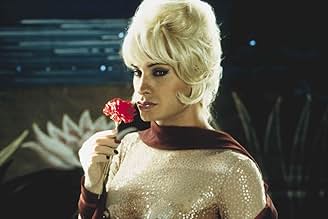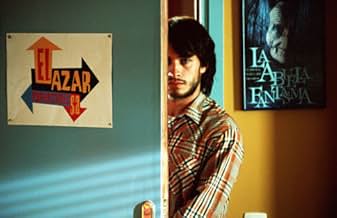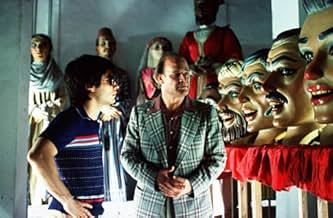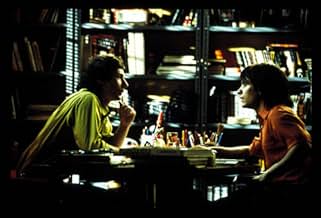NOTE IMDb
7,4/10
65 k
MA NOTE
Examen de l'impact de l'enseignement religieux sous Franco et de l'abus sexuel sur la vie de deux amis de longue date.Examen de l'impact de l'enseignement religieux sous Franco et de l'abus sexuel sur la vie de deux amis de longue date.Examen de l'impact de l'enseignement religieux sous Franco et de l'abus sexuel sur la vie de deux amis de longue date.
- Réalisation
- Scénario
- Casting principal
- Nomination aux 1 BAFTA Award
- 16 victoires et 42 nominations au total
Nacho Pérez
- Ignacio
- (as Ignacio Pérez)
Raúl García Forneiro
- Enrique
- (as Raúl Gª Forneiro)
Agustín Almodóvar
- Limpiador Piscina
- (non crédité)
Pedro Almodóvar
- Limpiador Piscina
- (non crédité)
Robert Forcadell
- Man in public
- (non crédité)
Luis Lobos Negros
- Motero ochentero
- (non crédité)
Avis à la une
The latest film by Almodovar after the awarded All about my mother and Talk to her has divided the public opinion. Part of the audience say its the continuity of the director's talent and the other part does not like the film at all. But this division has always happened with Almodovar films, you love it or you hate it.
Of course the subject of the church and the pederasty has provoked scandals, like the cancellation of the film in many French cinemas, but despite this fact the film has been the one chosen (and the first Spanish film) to open the Cannes festival.
In the film we can feel Almodovar touch everywhere: the tremendously deep characters, the unbelievable plot and the colourful scene as well as in the camera angles. All this things make Almodovar maintain a fidelity to his style. Another curiosity is the cameo that the director's brother, who appears in most of his films, does, in this case as a pool cleaner.
The Gael Garcia's acting, without Mexican accent, is wonderful and he shines as a travestite femme fatale, an icon to noir films, just as Almodovar likes to describe the film.. The atmosphere of the film carries us to the 80s thanks to its perfect job of decoration and wardrobe documentation .
Of course the subject of the church and the pederasty has provoked scandals, like the cancellation of the film in many French cinemas, but despite this fact the film has been the one chosen (and the first Spanish film) to open the Cannes festival.
In the film we can feel Almodovar touch everywhere: the tremendously deep characters, the unbelievable plot and the colourful scene as well as in the camera angles. All this things make Almodovar maintain a fidelity to his style. Another curiosity is the cameo that the director's brother, who appears in most of his films, does, in this case as a pool cleaner.
The Gael Garcia's acting, without Mexican accent, is wonderful and he shines as a travestite femme fatale, an icon to noir films, just as Almodovar likes to describe the film.. The atmosphere of the film carries us to the 80s thanks to its perfect job of decoration and wardrobe documentation .
Is it an accusation of the Catholic Church or is it the story of a priest who is bound by his religion to strict rules concerning sex and feelings? Is there a theme in the film or is it just a story? Those are a couple of questions I asked myself after seeing La Mala Educación from the Spanish director Pedro Almodóvar.
Actually, La Mala Educación exists of three stories which have been interwoven in a miraculous way. Story one: film director Enrique is being paid a visit by a long lost friend. That friend, Ignacio, is an actor and has written a story that Enrique might want to make into a film. Enrique's story is for one part made up by Ignacio's and Enrique's experiences when they were young boys and were living in a Catholic boarding school. Ignacio reads the manuscript and sees the pictures in his head, and that is story two: a transvestite finds an old friend, Ignacio. After having sex, the transvestite steals a manuscript Ignacio wrote about his secret: while in boarding school he was sexually abused by a priest. To gain money, the transvestite blackmails the priest: give me money or I'll publish the manuscript. The priest reads parts of the manuscript. And that is the third story: the experiences of the real Enrique and the real Ignacio while attending boarding school. During that time they discovered the meaning of friendship, love and physical desires.
You have to keep up with the film. When your attention wanes you might miss a detail that's important later. When seeing the film, try to remember the names of the characters very quickly. It makes viewing easier.
Is La Mala Educación a typical Pedro Almodóvar film? Yes and no. No, since women are not the main theme, as in his other films. No, because it's not an unbelievable and absurdist story. Yes, since the film has some typical Almodóvar characteristics: the transvestite, the junkie that is caught on the lee shore, and the hope people have to reach a better life. More than in other Almodóvar films homosexuality is an important theme.
When the film was over you could see the visitors of the cinema thinking: is it a film about the Catholic Church, about emotions and selfishness, about The scenes had to fall in place.
Actually, La Mala Educación exists of three stories which have been interwoven in a miraculous way. Story one: film director Enrique is being paid a visit by a long lost friend. That friend, Ignacio, is an actor and has written a story that Enrique might want to make into a film. Enrique's story is for one part made up by Ignacio's and Enrique's experiences when they were young boys and were living in a Catholic boarding school. Ignacio reads the manuscript and sees the pictures in his head, and that is story two: a transvestite finds an old friend, Ignacio. After having sex, the transvestite steals a manuscript Ignacio wrote about his secret: while in boarding school he was sexually abused by a priest. To gain money, the transvestite blackmails the priest: give me money or I'll publish the manuscript. The priest reads parts of the manuscript. And that is the third story: the experiences of the real Enrique and the real Ignacio while attending boarding school. During that time they discovered the meaning of friendship, love and physical desires.
You have to keep up with the film. When your attention wanes you might miss a detail that's important later. When seeing the film, try to remember the names of the characters very quickly. It makes viewing easier.
Is La Mala Educación a typical Pedro Almodóvar film? Yes and no. No, since women are not the main theme, as in his other films. No, because it's not an unbelievable and absurdist story. Yes, since the film has some typical Almodóvar characteristics: the transvestite, the junkie that is caught on the lee shore, and the hope people have to reach a better life. More than in other Almodóvar films homosexuality is an important theme.
When the film was over you could see the visitors of the cinema thinking: is it a film about the Catholic Church, about emotions and selfishness, about The scenes had to fall in place.
In "La Mala Educación", Almodóvar is very serious and too dark and tragic, when comparing to his previous movies. There are many usual elements, such as the attack to the Catholic Church, gays, travesties, homosexual intercourse, child abuse etc., but not in his common ironical, colorful and funny way; instead, the story is developed in a very bitter context. The screenplay magnificently discloses the plot, with a story inside another story, mixing "reality" with fiction; the direction of Pedro Almodóvar is excellent as usual; and Gael Garcia Bernal proves his versatility as an outstanding actor. Although being a great film, I do not dare to recommend "La Mala Educación" for any audiences. However, fans like me of this great Spanish director will certainly like it a lot. My vote is eight.
Title (Brazil): "Má Educação" ("Bad Education")
Title (Brazil): "Má Educação" ("Bad Education")
It is a very good film, although not as absolutely great as "Todo sobre my madre" and "Hable con ella"... Maybe because "Mala education" is sadder and darker than the previous Almodòvar films, the theme (the child abuse during college years) is disturbing and depressing, of course.
Almodòvar chooses this time a "noir" story. Enrique, a young movie director, looks for ideas for his next film. By chance he meets Ignacio, an old fellow of the college and his first love. Ignacio gives him a tale written by him, about the sexual abuses on him made by a priest during his childhood, in the college. This will be the inspiration for Enrique's movie, but the director will discover another dramatic truth...
In this film the gay element -which exists in all the Almodòvar's movies- comes back, stronger than in his last films. But above all there's the child rape problem, this is one of the most delicate themes the Spanish director has ever talked about. And naturally "Mala educacion" is one of his most tragic films. Whereas in the previous movies Almodòvar always let a place for hope, with this film it's not the case. That's why it is a very difficult tale to watch.
Cinematography is excellent, the music as well (with many recalls to the Sixties songs). Actors are also very good. For Gael Garcia Bernal (we saw him recently in "Motorcycle diaries") this is another solid effort. He portrays Ignacio, he enters the Almodòvar world with all the ambiguity required.
Almodòvar chooses this time a "noir" story. Enrique, a young movie director, looks for ideas for his next film. By chance he meets Ignacio, an old fellow of the college and his first love. Ignacio gives him a tale written by him, about the sexual abuses on him made by a priest during his childhood, in the college. This will be the inspiration for Enrique's movie, but the director will discover another dramatic truth...
In this film the gay element -which exists in all the Almodòvar's movies- comes back, stronger than in his last films. But above all there's the child rape problem, this is one of the most delicate themes the Spanish director has ever talked about. And naturally "Mala educacion" is one of his most tragic films. Whereas in the previous movies Almodòvar always let a place for hope, with this film it's not the case. That's why it is a very difficult tale to watch.
Cinematography is excellent, the music as well (with many recalls to the Sixties songs). Actors are also very good. For Gael Garcia Bernal (we saw him recently in "Motorcycle diaries") this is another solid effort. He portrays Ignacio, he enters the Almodòvar world with all the ambiguity required.
Enrique is a film director working on his new project when an old school friend, Ignacio, arrives looking for acting work. Enrique fobs him off with excuses and Ignacio leaves him with a story he has written called 'The Visit'. The story is based on their childhood together as well as having a totally fictional section where Ignacio (Zahara). As Enrique reads the story it takes him back to his childhood effectively where they fell in love as boys before being separated by Father Manolo who also loved Ignacio. When he decides to make the film of the story it only serves to spark more memories as well as bringing revelations.
When I read the plot summary for this film I assumed that it would be difficult to penetrate (pardon the pun) and that I would struggle to follow it. Now that I think back on it I wonder how on earth I managed to follow a film that has threads and characters that don't exist even within the film and it is to the film's credit that it works really well. The film appears to have about three of four stories but really it is only one story that we are being told and a very effective story it is. It is engaging and very well written we care about the characters even as they change and trick us. Only the final 20 minutes appear to be unsure of themselves and it is here that the film drags slightly, but at till this point it is all great. This is not to say it is an easy watch because it isn't.
If you are homophobic then this is not the film for you I am used to seeing shows (Oz, 6 Ft Under) where such acts are portrayed but I was taken aback by the graphic nature of the acts here. I don't mean you see anything but it leaves very little to your imagination. This is not a problem it's just that many men may find this difficult to watch. Likewise scenes involving mutual masturbation between young boys is hardly something that one can watch without feeling slightly uncomfortable. However the one thing the film does through all this is deliver good characters. As much as I couldn't watch Ignacio licking his fingers to wet his 'area' and ease penetrate I still liked him as a character. Even more pleasing was the fact that the film never makes Father Manolo a monster; of course there is no sympathy for the man in the film but it could have just made him a lecherous beast who the audience immediately hate a pantomime villain but the script creates a more complex character.
The cast do a great job of delivering these characters and they make it work very well even if come of them have to change characters midstream or be one of several actors playing the same character. Martínez plays the most consistent character in the film and he does well with a good part, even if he has a less showy role than some others. Bernal has the most difficult role and he does really well to keep the audience with him while delivering all sorts of roles! If nothing else he is a brave actor and he deserves good parts to do more work like this. I don't know the rest of the actors by name but I enjoyed the other queen in the fictional part and also the guy who played Manolo in the fictionalised and childhood sections. Boira's Ignacio lacks subtlety and is overblown but by his point of the film I think that was the whole point.
Overall this is far from most people's cup of tea even those used to seeing art films may find it hard going due to the graphic simulation of the sexual acts within the film. But despite this the film is really well delivered. Many Almodóvar fans have said this is one of his lesser films but I cannot agree when I think of the skill he displays in keeping the difficult narrative together. The characters are mostly well written and the story is engaging even if it flags a little bit at the end.
When I read the plot summary for this film I assumed that it would be difficult to penetrate (pardon the pun) and that I would struggle to follow it. Now that I think back on it I wonder how on earth I managed to follow a film that has threads and characters that don't exist even within the film and it is to the film's credit that it works really well. The film appears to have about three of four stories but really it is only one story that we are being told and a very effective story it is. It is engaging and very well written we care about the characters even as they change and trick us. Only the final 20 minutes appear to be unsure of themselves and it is here that the film drags slightly, but at till this point it is all great. This is not to say it is an easy watch because it isn't.
If you are homophobic then this is not the film for you I am used to seeing shows (Oz, 6 Ft Under) where such acts are portrayed but I was taken aback by the graphic nature of the acts here. I don't mean you see anything but it leaves very little to your imagination. This is not a problem it's just that many men may find this difficult to watch. Likewise scenes involving mutual masturbation between young boys is hardly something that one can watch without feeling slightly uncomfortable. However the one thing the film does through all this is deliver good characters. As much as I couldn't watch Ignacio licking his fingers to wet his 'area' and ease penetrate I still liked him as a character. Even more pleasing was the fact that the film never makes Father Manolo a monster; of course there is no sympathy for the man in the film but it could have just made him a lecherous beast who the audience immediately hate a pantomime villain but the script creates a more complex character.
The cast do a great job of delivering these characters and they make it work very well even if come of them have to change characters midstream or be one of several actors playing the same character. Martínez plays the most consistent character in the film and he does well with a good part, even if he has a less showy role than some others. Bernal has the most difficult role and he does really well to keep the audience with him while delivering all sorts of roles! If nothing else he is a brave actor and he deserves good parts to do more work like this. I don't know the rest of the actors by name but I enjoyed the other queen in the fictional part and also the guy who played Manolo in the fictionalised and childhood sections. Boira's Ignacio lacks subtlety and is overblown but by his point of the film I think that was the whole point.
Overall this is far from most people's cup of tea even those used to seeing art films may find it hard going due to the graphic simulation of the sexual acts within the film. But despite this the film is really well delivered. Many Almodóvar fans have said this is one of his lesser films but I cannot agree when I think of the skill he displays in keeping the difficult narrative together. The characters are mostly well written and the story is engaging even if it flags a little bit at the end.
Le saviez-vous
- AnecdotesGael García Bernal fired off an angry riposte to New York Times reporter Lynn Hirschberg after she claimed that he had fallen out with Pedro Almodóvar over filming the explicit homosexual love scenes in the film. Bernal wanted it on record that he had had absolutely no reservations about taking the role.
- GaffesWhen Burenguer declines Ignacio's story over the phone, he says that he wouldn't be accepting it for "Short Stories of the 80's." According to his story, it would have had to been at least 1977, three years before the 1980s, let alone before a compilation of stories from the 1980s would be released.
- Versions alternativesAn R-rated version of the film that trims or cuts some scenes was released on DVD, though the original NC-17 one is also available in the exact same format.
- Bandes originalesQuizás, Quizás, Quizás
Written by Osvaldo Farrés
Published by Peer International Corporation (BMI)
(c) 1947 by Caribbean Music Co. Ltd
Performed by Sara Montiel
By the license from Dpto. de Productos Especiales de (p) EMI Odeon, S.A., Madrid, España, 2003
Meilleurs choix
Connectez-vous pour évaluer et suivre la liste de favoris afin de recevoir des recommandations personnalisées
- How long is Bad Education?Alimenté par Alexa
Détails
- Date de sortie
- Pays d’origine
- Site officiel
- Langues
- Aussi connu sous le nom de
- Bad Education
- Lieux de tournage
- Sociétés de production
- Voir plus de crédits d'entreprise sur IMDbPro
Box-office
- Budget
- 5 000 000 $US (estimé)
- Montant brut aux États-Unis et au Canada
- 5 284 284 $US
- Week-end de sortie aux États-Unis et au Canada
- 147 370 $US
- 21 nov. 2004
- Montant brut mondial
- 40 432 275 $US
- Durée
- 1h 46min(106 min)
- Mixage
- Rapport de forme
- 2.35 : 1
Contribuer à cette page
Suggérer une modification ou ajouter du contenu manquant































